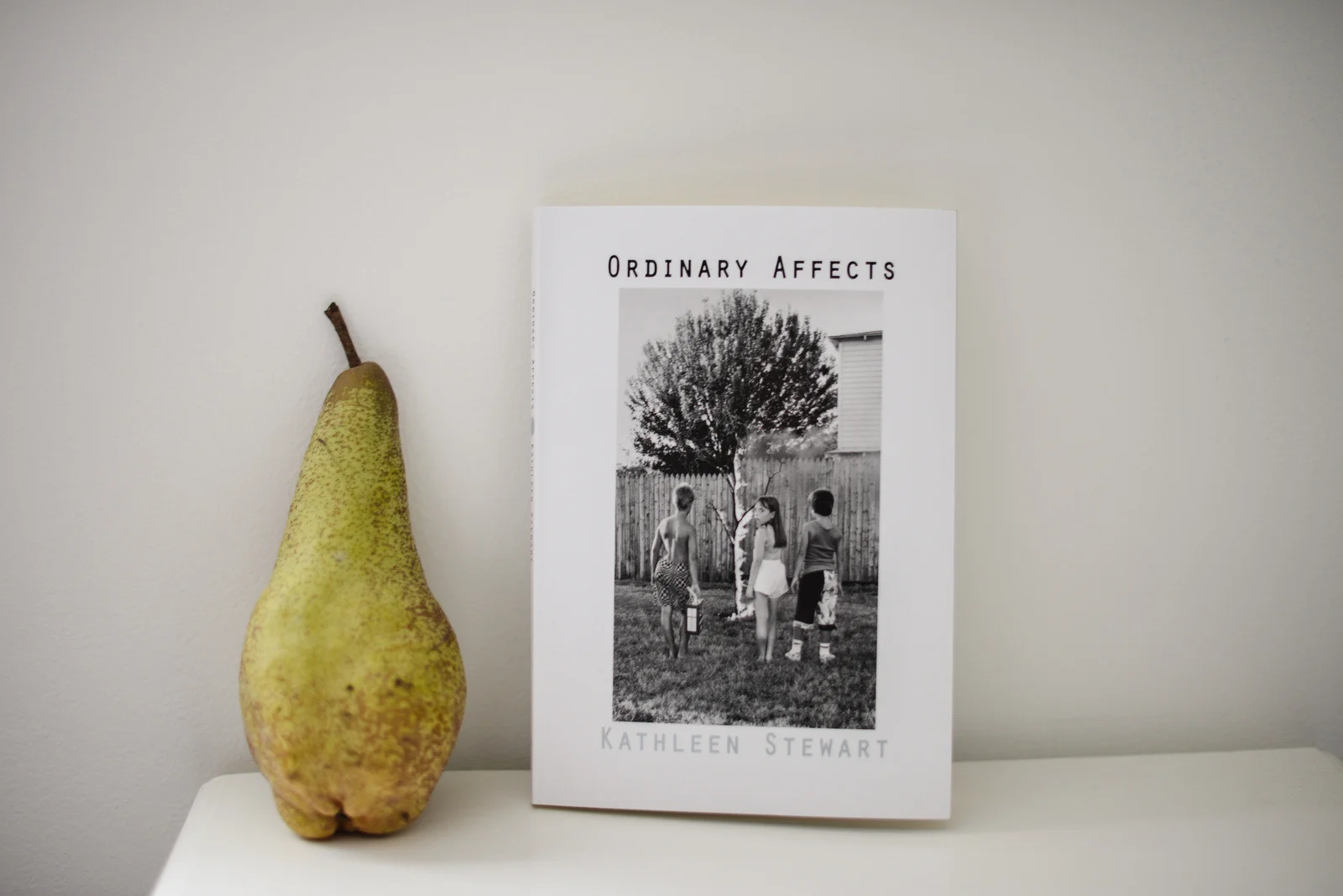Ordinary Affects
I'm someone who is drawn to those slightly odd books, difficult to classify into genre, hard to find in a bookstore. Ordinary Affects is a scholarly, lyrically written book, by Kathleen Stewart, a professor of anthropology at the University of Texas. It came out in 2007, but because I hadn't bothered to check the publication date for some reason, as I was reading it, I was under the impression it had come out in the last couple of years.
I should also mention that upon picking it up I had no knowledge whatever of the study known as “affect theory.” And maybe I wouldn't have jumped into the book quite so eagerly if I'd imagined I needed to learn about the theoretical underpinnings. As it turns out, I think having read poetry for 30 some years is enough background, though my reading has also piqued my interest in further studies.
So. Ordinary Affects contains short ruminations, observations, anecdotes about and engagements with ordinary American life. It reminded me at times of stories by Lydia Davis. It reminded me a bit of my own forthcoming book, The Flower Can Always Be Changing. Another writer has compared Stewart's writing to Francis Ponge's object poems. It made me think, and it brought to mind situations, experiences, feelings that I've had. The book, says Stewart, “is an experiment, not a judgment.” And she describes the project in this way:
“The ordinary is a shifting assemblage of practices and practical knowledges, a scene of both liveness and exhaustion, a dream of escape or of the simple life. Ordinary affects are the varied, surging capacities to affect and to be affected that give everyday life the quality of a continual motion of relations, scenes, contingencies, and emergences. They're things that happen. They happen in impulses, sensations, expectations, daydreams, encounters, and habits of relating, in strategies and their failures, in forms of persuasion, contagion, and compulsion, in modes of attention, attachment, and agency, and in public and social worlds of all kinds that catch people up in something that feels like something.”
Things happen in our ordinary day, we attend to them, we brush them aside, we are moved by them, we move on. Nevertheless, they stay with us.
There are short pieces on things like dryer sheets, a first date, being in traffic or the grocery store checkout line, an interaction with a homeless person, playing the slots, talking to the cashier at Target, staying at a hotel after being stranded by air travel.
The stories Stewart tells are unsettling, but familiar. The thing is, as we all know, “the ordinary can turn on you. Lodged in habits, conceits, and the loving and deadly contacts of everyday sociality, it can catch you up in something bad. Or good.” Likewise: “...it can start out as one thing and then flip into something else altogether.”
The anecdotes and descriptions of ordinary moments seem to hang. There is “a vagueness” to them. But, Stewart says, “the unfinished quality of the ordinary is not so much a deficiency as a resource, like a fog of immanent forces still moving even though so much has already happened...”
I particularly enjoyed Stewart's thoughts on still life. She says, “A still is a state of calm, a lull in the action. But it is also a machine hidden in the woods that distills spirits into potency through a process of slow condensation.” She talks about the way in painting a still life suspends “sensory beauty in an intimate scene” and goes on to talk about Hitchcock's films, and how “a simple pause of the moving camera to focus on a door or a telephone could produce a powerful suspense.” (Which is interesting to me especially since Rob has moved from painting still lifes to movie stills....).
One morning this week I was at the grocery store, and I was thinking about that part of our ordinary life that we experience so often, so repeatedly. How our interactions there at the grocery store are carried through our day, through our lives. Yet we rarely think about how important that transaction is. This particular morning the person ringing me through talked about a previous regular customer with Tourettes and how she tries to just speak to him as she would anyone else, even though he intermittently erupts. Imagine how hard it was for him to just come to the store, she said. Then she told me about an encounter she had recently where a homeless person who was buying a sandwich and a couple of other food items didn't have enough money. The person behind in line quietly paid for everything, no big deal. It was the best moment, she said. Such kindness. People can be difficult, she said, some people don't even want you to touch their food. But there are good people, too. Yes, I said, yes.








